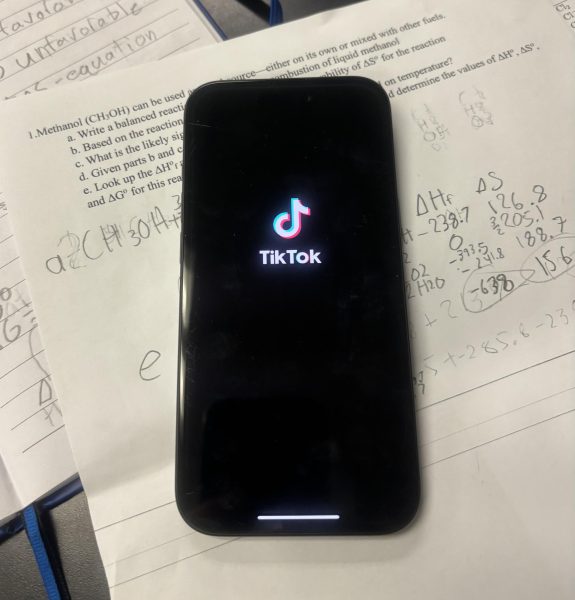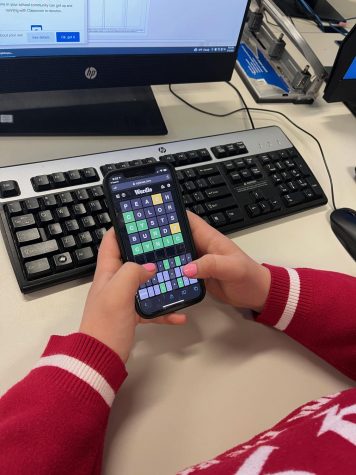The Burden of Taking More Pictures
Hundreds of pictures in our smartphones could be weighing us down.
Senior Tommy Girard playing on his phone while he should be doing work.
![]() Loading ...
Loading ...
Nothing enrages me more than when I see people taking videos at a concert instead of enjoying the music. Have photos lost their meaning as we are able to take so many without worries of storage or cost? I suspect they have.
People have so many photos on their phones that they’ve lost their novelty. According to gigaom.com, a study from the personal media startup website Magisto says that the average mobile phone user takes 150 photos a month. The study also conveys that the average mobile phone user has 630 digital photos and 24 videos on their camera roll. How is one supposed to find a photo they are looking for out of 630 photos? If someone over 600 photos on their camera roll and had a few photos deleted, would they even notice? The photos we take aren’t as important as we accept them to be.
The experience of taking the picture or video itself is also well-worth discussing as an issue. Some concert attendees would rather view the concert that they paid good money to see, through their phone rather than literally watching it right in front of them. A Twitter user by the name of Harry Seaton tweeted, “I’m all for filming bits of concerts but ” There are multiple people that are annoyed with the constant need to snap a quick pic or two (or twenty.) It takes away from the joy of being right in front of an amazing artist and puts that joy in the power of your smartphone that you can already go on any time of the day. This societal set back is certainly not limited to concerts. In everyday life, if someone sees something amazing, they don’t try and capture every glimpse of it with their vision to store in their brain, they pull out their smartphones in hopes of getting some approval of their peers later when they show them a picture of something they could have actually been a part of.
Recently I had to factory reset my phone in order to fix it because I was locked out of it. A factory reset is when your phone wipes all of its memory and restores itself back to the way it was straight from the factory. By doing this I lost all of the digital pictures on my smartphone. After doing this I realized that I didn’t really need those pictures in the first place. They didn’t really matter a whole lot. I wasn’t struggling to cope with the loss of all my pictures, I could barely remember any of them. The pictures that I have taken on my phone now are snapshots that actually mean something to me, they make me feel something that is important. Maybe I would remember more of the experiences that I took pictures of if I got off my phone and concentrated more on getting the most out of what I was doing. I could’ve made new friends or changed someone’s life, instead of taking out my phone to take a picture of a sunset that I’ll probably delete next week.
Some might say that they want other people to see what they saw so that might be interested in the topic. But I would much rather hear a description of an amazing time someone had through their awestruck descriptive words. I would be much more interested if you described a phenomenal experience when you saw your favorite band, rather then a video shot from 300 feet away that sounds like blender ASMR. People are constantly looking at images all day long and talking to other people less and less. Odds are they will be delighted to have a conversation with you instead of just mindlessly gandering at another artificial image that they will forget about as quickly as they scroll to the next.
Taking digital photos with our smartphones has become a modern advance for most, but a true burden for me. If any further progress is to be made in technology, what should come first is learning how to appropriately use it. We should make our life so enjoyable and memorable that we don’t even need to take a picture of it.
Hello, my name is Nathaniel Howard, and I am a junior at Triton Regional High School. I am a pretty mellow guy, I enjoy being creative and just talking...








